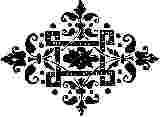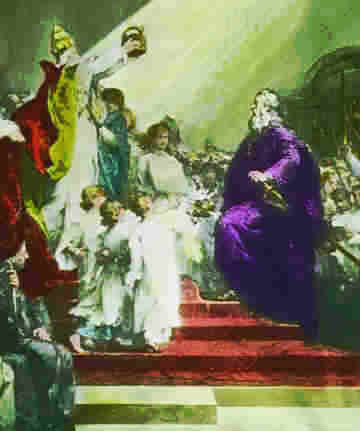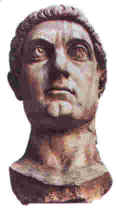The story of the leopard beast is the longest story in Revelation.
It covers Revelation Chapters
13 to 19, where finally the leopard beast and the false
prophet are "cast alive into a lake of fire burning with brimstone."
(Revelation 19:20)
All is well that ends well. A fitting end to this terrible and cruel
beast. At the end of the reign of Christ the devil is also cast into this same "lake
of fire." (Revelation 20:10) So shall it be with all the enemies of righteousness
when at last the triumph of Christ is complete. If there is a God in heaven, this must
surely be the end of such evil institutions and beings that practice lies and deception to
deceive the people of earth.

The Beginning that Led
to Such an Ignominious End
Usually it is not good to tell of the end before the beginning, but
the Lord’s people should know at the outset that this terrible leopard beast shall
not triumph over the saints.
Treachery is greatest when something poses as a servant of truth and
righteousness, while beguiling and misleading many good people away from the service of
God and righteousness to institutionalized perversion. How many have started out to serve
God and righteousness who were later subverted into the service of Satan!
The desire to serve, normally a good desire, is easily perverted into
self-seeking, power lust, and self-aggrandizement. Hence, many who sought to serve God
unwittingly lost their way. Perhaps few willed to do this, but the arts of the devil are
beguiling. Once they succumbed to the influence of the leopard beast, they found
themselves sliding down the slippery slope of sin and degradation under the guise of
religion.
Satan and the fallen angels are masters at using religion to serve
everything else but God and holiness. There is probably no evil that has not been done in
the name of religion.
"And I stood upon the sand of the sea, and
saw a beast rise up out of the sea, having seven heads and ten horns, and upon his horns
ten crowns, and upon his heads the name of blasphemy."
Revelation 13:1
Three
beasts in Revelation have "seven heads" and "ten horns."
|
Rev. 12 |
Red Dragon |
7 Heads |
10 Horns |
Crowns on
Heads |
|
Rev. 13 |
Leopard-Like
Beast |
7 Heads |
10 Horns |
Crowns on
Horns |
|
Rev. 17 |
Scarlet Beast |
7 Heads |
10 Horns |
No Crowns |
These three beasts share a similar time span.
All three are on the scene at Armageddon. The leopard beast is a composite creature, a mix
of "leopard," "bear" and the "mouth of a lion."
(Revelation 13:2)
This immediately tells the reader that the leopard beast is not
God’s creation. God created everything "after its kind." There are no mixed
creatures in God’s creation. Hence, immediately the student is made aware that this
leopard beast is of Satan.
The rise of the leopard beast came from the "sea," the
restless masses. It was not the Roman aristocracy and the politically powerful that gave
rise to this papal beast. Rome had many gods and goddesses—actually some three thousand.
"As no man can serve two masters," so it is impossible for anyone to follow
three thousand gods.
The Christian religion taught singular devotion to one God, the only
wise and true God. The Christian religion appealed to the measure of godlikeness left in
the human heart. It was noble, it was pure, it was kind, and it spoke to the highest
quality that man has—love. It appealed to the human heart seeking after God.
It was the "restless masses" who were ready to receive the
elevating influence of Christianity. The poor masses suffered from the abuses of the rich,
powerful and politically connected. They were not privileged to corrupt themselves.
Christianity preceded the rise of this papal beast. "The mystery
of iniquity" began to work within the Christian community. Even as the apostles
established ecclesias, the devil was at work causing "contentions." (1
Corinthians 1:11-13) The Apostle Paul said, "the mystery of iniquity doth already
work."
(2 Thessalonians 2:7)

WHEAT
|

TARES
|
Christianity, which appealed most to the restless masses of mankind,
became a seedbed for Satan to "sow tares" among the "wheat." Just as
our first parents were supposed to populate the earth with perfect people but were soon
beguiled into sin, filling the world with a progeny infected with sin,
so Satan has not lost
his cunning to repeat the same methods with the Christian Church. Only the power of God
has kept the true saints from being corrupted by the adversary.

"Upon His Heads
the Name of Blasphemy"
"And I stood upon the sand of the sea, and saw a beast rise up out of the sea,
having seven heads and ten horns, and upon his horns ten crowns, and upon his heads the
name of blasphemy." Revelations 13:1
No sooner is the leopard beast introduced, than it is labeled in a
most derogatory way. The seven uncrowned "heads" are said to have "the name
of blasphemy."
When the bishops accepted Constantine as "Pontifex Maximus"
[chief religious ruler], they renounced the headship of Christ. This was blasphemy.
|
Subsequently, "no less than sixty-two blasphemous titles" were applied to the
pope (THE TIME IS AT HAND,
p. 307 ). ).
Titles such as: "Most Divine of all Heads," "Pontiff
Supreme over all Prelates," "Christ by Unction," "Prince of
Bishops," "Infallible Pope," etc.
The apostles were only known as Peter, James, John, etc.
The papal rulers adopted blasphemous titles, and with these also came
privilege, wealth and power.
|

|
The papal beast was ruthless, mean, extremely proud and pretentious. It
seemed remarkably fashioned after the three universal empires of Daniel
(Daniel 7:4-7), having "the
mouth of a lion," "the feet of a bear" and "like
unto a leopard."
(Revelation 13:2) The qualities of the roaring and intimidating lion, the grasping bear, and
the stealthy leopard made this a dreadful beast. Its overall appearance made it
exceedingly "dreadful and terrible" as the
fourth beast in Daniel 7:7 was. This unholy mixture was the work of the
devil.
It may be asked how the "name of blasphemy" became
associated with the heads of this papal beast. Once Constantine, the first
"head," accepted the Christian religion as that of the state, the alleged
Christian religion continued through successive governments of Rome. It ceased to be true
Christianity, but became the religion of the state.
There were actually seven great emperors who molded the history of the
Roman Empire. The church and state arrangement started with Constantine. Before that time
Christianity was not accepted by the state. As a matter of fact, Christianity was
competitive with the pagan gods of Rome.
| 1st Head |
Constantine |
Converted Roman
Empire
to Christianity |
| 2nd Head |
Valentinian |
Emperor of the
Divided Empire |
| 3rd Head |
Justinian |
Declared Bishop
of Rome
head of all holy churches |
| 4th Head |
Charlemagne |
Began 1,000 Year
Reign of
"Holy Roman Empire" |
| 5th Head |
Napoleon |
Restored Catholic
Church
as religion of France |
| 6th Head |
Francis Joseph of
Austria-Hungary |
1848-1916 |
| 7th Head |
Hitler |
Nazi-Fascist
Regime from 1929-1945 |
Valentinian, the second head, became the emperor of the divided empire.
Then Justinian, the third head emperor, declared the bishop of Rome head of all the holy
churches. The fourth head was Charlemagne, who set in motion the 1,000 year rule of the
"Holy Roman Empire."

Coronation of Charlemagne
Began the "Holy Roman Empire"
|
The fifth head became the short-lived era of
Napoleon, who restored the Catholic Church as the religion of France, albeit with a short
lease. The sixth head Francis Joseph, of Austria-Hungary (1848-1916), followed this. The
seventh head was Hitler, with his Nazi-Fascist regime that ruled between 1929-1945.
The allusion that the Roman Empire was Christian and a part of the
Kingdom of God on earth deserved the name of "blasphemy."
These emperors had empowered the church in various ways—some more,
some less—but always enabling the papacy to exercise authority in government. Sometimes,
with vast holdings of territories, the emperors ruled Papal States.
While the emperors and rulers of the Roman Empire did have a God-given
right to rule during the Gentile Times, yet this rule was not to be considered a part of
God’s Kingdom. The Gentile rule was to take place in the interregnum between the
typical kingdom of God (that was taken away from Judah with Zedekiah’s fall) and the
real Kingdom of God under Christ, which is set up at his return. These emperor
"heads" were neither Christian, nor the Kingdom of God—this was blasphemy.
It should be noticed that "ten horns" of papacy were
crowned. Not only were the emperors or "heads" considered civil rulers
in God’s Kingdom, but also the "ten horns" or territorial rulers in the
Roman Empire were said to rule by "divine right." The papacy rose to
sufficient power at times to be very powerful in "crowning" and
"uncrowning" these ten territorial rulers.
There were four Gentile dominions, but only the last pretended to be
the Kingdom of God, whose emperors and lesser territorial kings were claimed to rule by
"the divine right of kings." Hence, we see the church and state were locked in
unholy union.
The Roman Church provided the religion of the empire, while popes
ruled the Papal States as a part of the governments of this earth. While most of the Papal
States have been taken away, still the vision of papacy is to claim back not only its
former states, but to increase its domain to include the whole world.
By this method, Papacy would set up the Kingdom of God on earth without the
return of Christ. The devil created a religious system that in turn reached out to become
a government in the earth—we call it the papacy. When the devil threw his mantel over
this whole arrangement and called it God’s Kingdom, this became blasphemy.

"The Dragon Gave Him His
Power,
and His Seat,
and Great Authority"
"And the beast which I saw was like unto a leopard, and his feet were as the feet
of a bear, and his mouth as the mouth of a lion: and the dragon gave him his power, and
his seat, and great authority." Revelation 13:2
We notice the "dragon gave him his power, and his seat, and
great authority." In Revelation 12 we found the dragon going to war to hold its power
in heaven. However, here we observe the dragon is quite a gentleman, giving the papal
beast "his power, and his seat, and great authority" in the civil matters of
earth.
Why this turnabout?
The dragon wished to control the nominal "heaven" just as he
controlled civil Rome. It would be convenient to control "heaven" and
"earth" from one throne. Finding his inability to sustain rule in
"heaven," the dragon changed tactics.
Within the early church was a "man-child" class. Soon it was
"caught up unto God, and to his throne"—the counterfeit throne of the
antichrist "who opposeth and exalteth himself above all that is called God, … so
that he as God sitteth in the temple of God, shewing himself that he is God."
(2 Thessalonians 2:4)
The "man child" of Revelation 12 is really nothing
more than the incipient beginning of the papal beast. It started out simply as
power-seeking bishops who were not recognized by Rome. Then this class of bishops accepted
Constantine’s headship, creating the papal beast.
It was Constantine that first gave civil authority to the bishops. The
need to do this occurred when Constantine moved his capital from Rome to Constantinople.

Emperor Constantine
|
 |
For the emperor to leave Rome was fraught with peril.
His prime worry would be that some general or political aspirant would seize power and
leave Constantine cut off from Rome. Hence, Constantine gladly bestowed favors on the
bishops, granting them some political power in Rome, wishing to divide power so that no
savvy aspirant would become too powerful.
Those in power always worry that someone may steal the base of their
authority. Herod was not the first one to seek to destroy the competitive rising King of
Israel. Insecurity caused many rulers to murder any possible aspirants. Hence, the dragon
gave authority to many bishops.
This marks the time when the bishops were no longer persecuted, but
gained status and authority in government. They changed from being bitterly persecuted
under Diocletian to being empowered by Constantine. Now the Roman Empire became the base
of the papal operation.